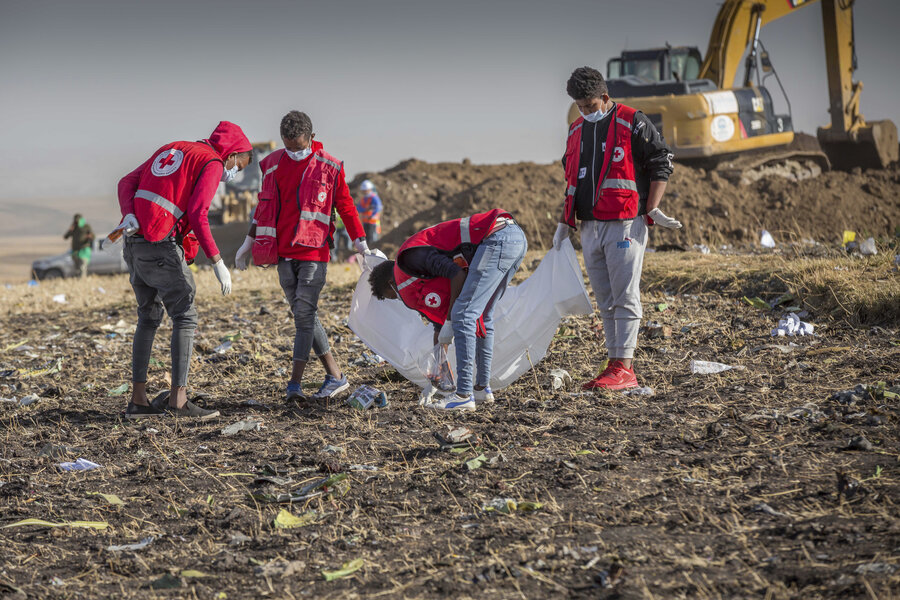Ethiopian crash a serious blow to Africa's best-managed airline
Loading...
| Ejere, Ethiopia
Ethiopian Airlines has grounded all of its Boeing 737 Max 8 aircraft as "an extra safety precaution" following the crash of one of its planes in which 157 people were killed, a spokesman said Monday, as Ethiopia marked a day of mourning and the plane's damaged "black box" of data was found.
Although it wasn't yet known what caused the crash of the new plane in clear weather outside Addis Ababa on Sunday, the airline decided to ground its remaining four 737 Max 8s until further notice, spokesman Asrat Begashaw said. Ethiopian Airlines had been using five of the planes and awaiting delivery of 25 more.
Some other airlines around the world were deciding to do the same. Aviation authorities in China and Indonesia along with Caribbean carrier Cayman Airways temporarily grounded their Max 8s.
Red Cross workers slowly picked through the widely scattered debris near the blackened crash crater, looking for the remains of 157 lives. A shredded book. A battered passport. Business cards in multiple languages. Heavy machinery dug for larger pieces of the plane.
The plane's "black box" of flight data and cockpit voice recorder had been found, Ethiopian Airlines said. An airline official, however, told The Associated Press that the box was partially damaged and "we will see what we can retrieve from it." The official spoke on condition of anonymity for lack of authorization to speak to the media.
Forensic experts from Israel had arrived to help with the investigation, said Ethiopian Airlines' spokesman Asrat. Ethiopian authorities lead the investigation into the crash, assisted by the United States, Kenya, and others.
"These kinds of things take time," Kenya's transport minister, James Macharia, told reporters.
People from 35 countries died in the Sunday morning crash six minutes after the plane took off from Ethiopia's capital en route to Nairobi. Ethiopian Airlines said the senior pilot issued a distress call and was told to return but all contact was lost shortly afterward. The plane plowed into the ground at Ejere near Bishoftu.
"I heard this big noise," one local resident, Tsegaye Reta, told the AP on Monday. "The villagers said that it was a plane crash, and we rushed to the site. There was a huge smoke that we couldn't even see the plane. The parts of the plane were falling apart."
Kenya lost 32 people, more than any country. Relatives of 25 of the victims had been contacted, Mr. Macharia said, and taking care of their welfare was of utmost importance.
"Some of them, as you know, they are very distressed," he said. "They are in shock like we are. They are grieving."
Canada, Ethiopia, the U.S., China, Italy, France, Britain, Egypt, Germany, India, and Slovakia all lost four or more citizens.
Leaders of the United Nations, the United Nations refugee agency, and the World Food Program announced that colleagues had been on the plane. The U.N. migration agency estimated that 19 U.N.-affiliated employees were killed.
Both Addis Ababa and Nairobi are major hubs for humanitarian workers, and some had been on their way to a large U.N. environmental conference set to begin Monday in Nairobi. The U.N. flag at the event flew at half-staff.
The crash was strikingly similar to that of a Lion Air jet of the same Boeing model in Indonesian seas last year, killing 189 people. The crash was likely to renew questions about the 737 Max 8, the newest version of Boeing's popular single-aisle airliner, which was first introduced in 1967 and has become the world's most common passenger jet.
Safety experts cautioned against drawing too many comparisons between the two crashes until more is known about Sunday's disaster.
The Ethiopian plane was delivered to the airline in November. The jet's last maintenance was on Feb. 4, and it had flown just 1,200 hours.
The crash shattered more than two years of relative calm in African skies, where travel had long been chaotic. It also was a serious blow to state-owned Ethiopian Airlines, which has expanded to become the continent's largest and best-managed carrier and turned Addis Ababa into the gateway to Africa.
This story was reported by The Associated Press with Elias Meseret reporting from Addis Ababa.





